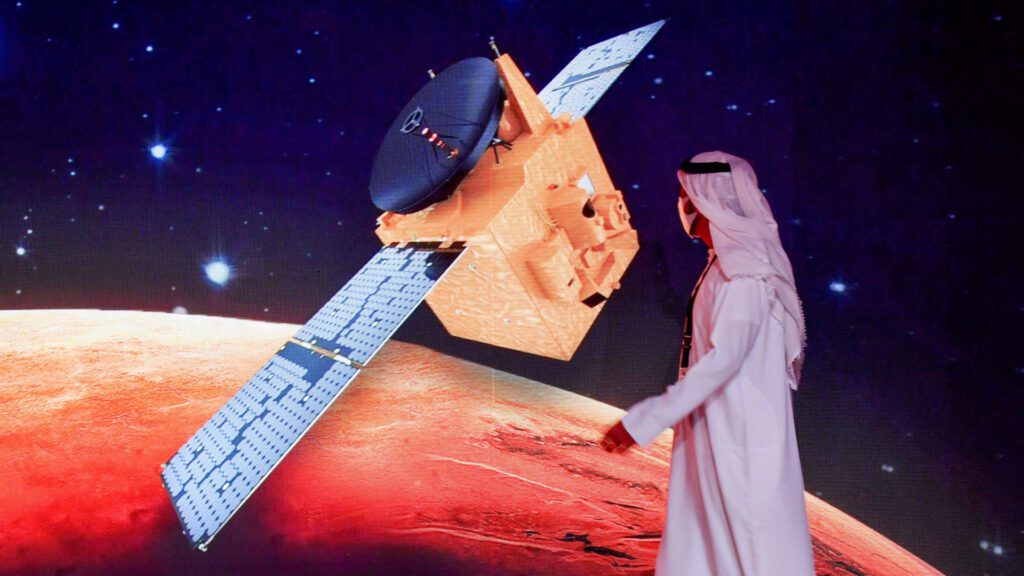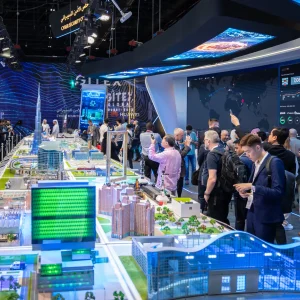In 2020, the UAE made an incredible leap into the annals of space exploration, marking a groundbreaking achievement by becoming the first Arab nation to reach Mars. The successful launch of the “Hope” probe sent waves of pride across the Arab world and positioned the UAE as a global space power. This achievement is not just a technological marvel but a symbol of ambition and progress in a region often associated with historical richness and modern-day advancements.
The Vision Behind the Mars Mission
The launch of the Mars Mission probe “Hope” was the culmination of years of preparation and strategic planning, supported by the UAE’s ambitious vision to diversify its economy and cement its place as a leader in space exploration. The mission aimed to gather critical data on the Martian atmosphere, providing scientists worldwide with new insights into the Red Planet. More importantly, it symbolized a forward-thinking approach and ambition for a future beyond Earth’s borders.
The UAE’s vision of becoming a space leader wasn’t just driven by scientific curiosity; it was about fostering innovation and inspiring future generations to dream beyond the stars. This mission also underscores the UAE’s commitment to using space as a tool to enhance its national capabilities, boost scientific research, and support sustainability efforts on Earth.

For the UAE, this mission represented a significant leap in its space exploration endeavors, which started just over a decade ago. The success of “Hope” proved the nation’s capability to undertake complex, international-scale projects that resonate across borders.
The Road to Mars Mission: Unveiling the “Hope” Probe
Launched on July 19, 2020, from Japan’s Tanegashima Space Center aboard the Mitsubishi Heavy Industries’ H-IIA rocket, the Mars mission was a first not just for the UAE but for the entire Arab world. The spacecraft, named “Al-Amal” in Arabic, meaning “Hope,” was designed to travel over 480 million kilometers to reach Mars. Its mission: to capture unique data on the Martian atmosphere, which will help scientists around the world understand more about Mars and its climate, particularly its weather dynamics and global dust storms.

The probe’s scientific goals were nothing short of ambitious. It was tasked with providing a comprehensive, global picture of Mars’ atmosphere, using three sophisticated instruments onboard: a UAE-built Emirates Mars Ultraviolet Spectrometer (EMUS), a Mars Infrared Spectrometer (EMIRS), and an Emirati-built Exospheric Sensor Suite (EXI). The Hope probe has been helping to monitor the Martian atmosphere’s daily changes, offering insights that could one day help humans better prepare for life on Mars.
International Collaboration and Global Recognition
While the UAE spearheaded the mission, it was far from a solitary effort. The UAE Space Agency partnered with leading institutions like the University of Colorado and the University of California to ensure the success of the mission. With the contributions of global experts, the Hope probe was equipped with cutting-edge technology and developed under the guidance of space industry leaders from around the world.
The global recognition that followed the successful entry of the probe into Mars Mission’ orbit was a testament to the hard work and dedication of the team behind it. Countries like the United States, China, and Russia, which have long dominated space exploration, applauded the UAE for its remarkable achievement.
The Hope probe’s success is not just a technical triumph but a demonstration of the UAE’s ability to collaborate globally, marking the Arab world as a key player in the international space community. This momentous occasion is a reflection of how investment in space exploration is not only a national endeavor but a global enterprise that brings humanity together.
Impact on the UAE and the Arab World
For the UAE, this milestone was more than a space mission; it was a catalyst for transforming the nation’s future. The mission emphasized the UAE’s commitment to technology, innovation, and education. It marked a new era in the nation’s scientific and technological evolution and presented a powerful opportunity to inspire Arab youth, especially in science, technology, engineering, and mathematics (STEM) fields.
The launch of the Mars Mission probe has ignited a newfound passion for space exploration across the region. It has inspired young minds to take an interest in scientific fields, pushing them toward careers in engineering, robotics, and aerospace science. Moreover, the UAE’s space aspirations have highlighted the potential for other Arab nations to embark on similar missions, contributing to a collective drive for progress and innovation in the Middle East.
In the long run, the “Hope” probe lays the foundation for the UAE’s space ambitions, which extend beyond Mars Mission. The country is already planning future lunar missions and is working on a project that aims to establish a human colony on Mars by 2117. The country’s space initiatives are not just about exploring the cosmos but about ensuring its place as a leader in technological and scientific advancements.
The Importance of the UAE Mars Mission in the Context of Global Space Exploration
The UAE’s Mars mission also brings important insights into how the global space race is evolving. For decades, space exploration was the domain of only the most advanced nations. However, the rise of space agencies in nations like the UAE signals the beginning of a new era. Space exploration is no longer limited to a handful of superpowers, but increasingly inclusive, inviting new players to participate in this crucial frontier.
The UAE’s participation in space exploration marks a shift in the global dynamic, emphasizing the importance of international collaboration and shared knowledge. As more nations engage in space exploration, the opportunities for discoveries and advancements multiply. The Hope probe offers valuable data that will be analyzed for years to come, adding to the collective knowledge of humanity’s understanding of Mars Mission.
Beyond Mars: UAE’s Future in Space Exploration
The success of the “Hope” mission was only the beginning. The UAE’s vision for space exploration is expansive, with ambitious plans to send more Mars Mission to the Moon and beyond. The UAE is committed to advancing scientific research, technological innovation, and international partnerships to create a legacy of excellence in space exploration.
Looking ahead, the UAE’s space program will continue to evolve. The country has already established the Emirates Mars Ultraviolet Spectrometer (EMUS) as a unique piece of scientific equipment used on the Mars probe, and it is expected to produce long-term benefits for space missions across the world. Additionally, the UAE plans to enhance its space sector by fostering innovation in artificial intelligence, robotics, and satellite technology.
The legacy of the Hope probe will surely inspire future generations to reach for the stars, reinforcing the importance of bold aspirations and perseverance. The UAE’s remarkable achievement in space exploration is a powerful reminder of how vision, ambition, and innovation can push the boundaries of what’s possible.
Conclusion: A New Chapter in Space Exploration
The UAE’s successful Mars mission is a landmark moment in the country’s history and the Arab world’s involvement in space exploration. The “Hope” probe, with its scientific objectives and ambitious goals, has opened a new chapter in the UAE’s space program and offered a vision of how space exploration can drive technological advancement, global collaboration, and inspire future generations. As the UAE looks ahead to new horizons, one thing is clear—the stars are no longer out of reach.
References:
- UAE Space Agency UAE Space Agency Website
- Hope Probe Mission Overview Hope Probe Official Site
- UAE Mars Mission Impact The National News
You can also read about, UAE: A Luxurious Tourist Paradise.













